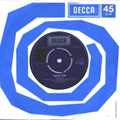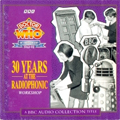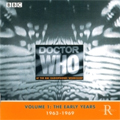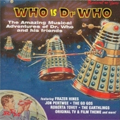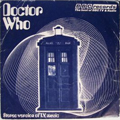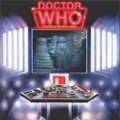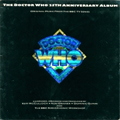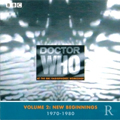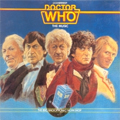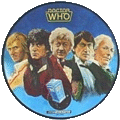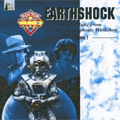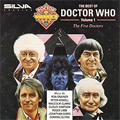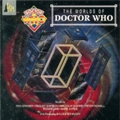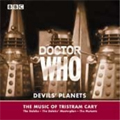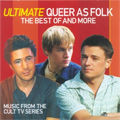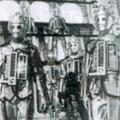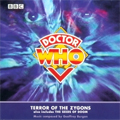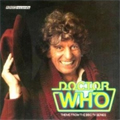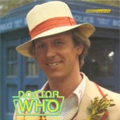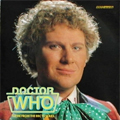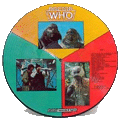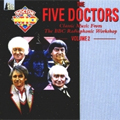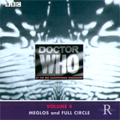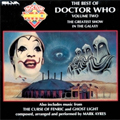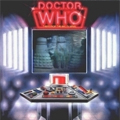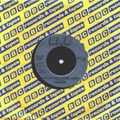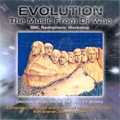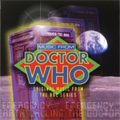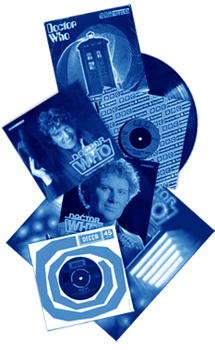
The infamous Doctor Who theme tune was written by Ron Grainer, who had already composed the popular themes for Steptoe and Son, Maigret and Comedy Playhouse; but the realisation of his melody was entirely the work of the BBC’s in-house electronic music department, the Radiophonic Workshop. In mid-1963, he had just finished an engagement with the Workshop concerning the death of steam railways, and was chosen by Who producer Verity Lambert not only for his writing talents, but also for his established relationship with the Workshop’s avant-garde musicians. Having been given a copy of the opening title graphics, Grainer wrote the Doctor Who score around the visuals, handing the Workshop his manuscript before he took a fortnight’s holiday. In that time, Delia Derbyshire and Dick Mills were to ‘realise’ the music based upon Lambert’s and Grainer’s suggestions (Verity had wanted something akin to the noise of wet fingers on glass, and Grainer’s score called for effects including “wind bubble and clouds”).
The final recording was an elaborate combination of separate notes and effects, played back in time with one another on several single-track machines. The bass-line was played on wires stretched over a plank of wood, plucked by hand before being re-tuned to record another note, with a Jason oscillator allowing the recorded notes to slide into each other. The melody notes were also recorded individually, and at half-speed to achieve the desired pitch, while the hiss and windbubble effects were created by carefully filtering white noise through a wobbulator. Grainer had prepared himself to hire a band to complete the Workshop’s arrangement, but Derbyshire’s composition was left untouched. “In those days people were so cynical about electronic music and so Doctor Who was my private delight”, Derbyshire told DWM in 1993. “It proved them all wrong.”
Demo: Delia Derbyshire and the BBC Radiophonic Workshop
[a] 1964 Mono Single
When the theme was first commissioned from the Workshop, Derbyshire prepared a full-length, mono ‘demo’ of Ron Grainer’s score. It remained the most complete and presentable version of the theme, and it is this recording that is generally released – although rarely untreated (see below!). Appearing first as a mono single in 1964 (taken direct from the master), it later resurfaced on the 30 Years at the BBC Radiophonic Workshop CD (with B.A.S.E. stereo enhancement) and opened the new Volume One CD from BBC Music (back in its authentic mono form).
| Title | Drn. | Primary Releases | Code |
| Dr. Who | 2’21” | Dr. Who / “This Can’t Be Love” | Decca F11837 |
| Original Theme | 2’21” | 30 Years at the BBC Radiophonic Workshop | BBCCD 871 |
| Doctor Who (Original Theme) | 2’21” | Volume One – The Early Years (1963 – 1969) | wMSF 6023-2 |
| Dr. Who (Original Theme) | 2’21” | Who Is Dr Who | RPM 200 |
[b] 1972 Stereo Single
In 1972, BBC Records contacted Delia Derbyshire to ask if she would mind the commercial release of the contemporary theme (as used since The Faceless Ones and last updated in 1970). Pointing out that there was no full-length version of the 1967 version, Delia, who also believed that the electronic “spangles” she had reluctantly added with Brian Hodgson only detracted from the music, instead created a pseudo-stereo mix of the original demo, opening with the cliff-hanger “sting” created for the 1970s version and featuring a stereo TARDIS “fly-by”, both mixed onto the track by Paddy Kingsland and Derbyshire herself.
| Title | Drn. | Primary Releases | Code |
| Doctor Who | 2’24” | Doctor Who / “Reg” | BBC RESL 11 |
| Doctor Who | 2’24” | Doctor Who / Doctor Who / Dr. Who (Cosmic Remix) | BBC ZRSL 193 |
| Doctor Who | 2’24” | The Doctor Who 25th Anniversary Album | BBC REB 707 |
| Doctor Who | 2’24” | Evolution – The Music from Doctor Who | CDSGP 0320 |
| Doctor Who | 2’24” | Music from Doctor Who | Castle Pulse |
| Doctor Who (Stereo Version) | 2’21” | Volume Two – New Beginnings (1970-1980) | WMSF 6024-2 |
[c] ‘TARDIS – Doctor Who’
Several years later, Dick Mills added the TARDIS Take-Off effect to the start of the 70s single and gave it a new title, “TARDIS – Doctor Who”. Appearing first on Doctor Who – The Music, this has since been released on several Silva Screen compilations (though the dub is several generations down from the master of the original demo).
| Title | Drn. | Primary Releases | Code |
| Doctor Who: The Music | 2’38” | Doctor Who: The Music | BBC REH 462 |
| TARDIS – Doctor Who | 2’38” | Doctor Who [first US 12″ picture disc] | BBC 22002 |
| TARDIS – Doctor Who | 2’38” | Doctor Who: Earthshock | FILMCD 710 |
| TARDIS – Doctor Who | 2’38” | The Best of Doctor Who Volume 1 | SD 1012 |
| TARDIS – Doctor Who | 2’38” | The Worlds of Doctor Who | FILMCD 715 |
| TARDIS – Doctor Who (Reprise) | 1’52” | Doctor Who: Earthshock | FILMCD 710 |
| TARDIS – Doctor Who (Reprise) | 1’52” | The Best of Doctor Who Volume 1 | SD 1012 |
[d] ‘New Stereo Remix 2002’ & 5.1 Remix
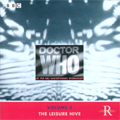
In 2002, BBC Music included a ‘Remix’ of the original Doctor Who theme by Mark Ayres, who had discovered the original recording among the Radiophonic Workshop archives. The glue holding the tape’s many complex edits in place had long-since dried-out, and Ayres found himself with the opportunity to feed each separate edit into his computer and create the theme anew – making full use of the stereo field. The rising hiss from the televised versions of the theme (see below) was also added to the mix twice (televised versions used only one). In 2006, a new improved Ayres remix was included on the BBC DVD release of ‘An Unearthly Child’ (as part of The Beginning boxed set), married with visual elements from the TARDIS take-off (from both versions of ‘An Unearthly Child’), the opening title sequence, and unused material from the original howlround test session. The closing windbubble was here remade from the original elements, unlike the 2002 CD version which simply copied that final chord from the mono single. The DVD presented the remix in stereo, 5.1 surround sound or mono.
| Title | Drn. | Primary Releases | Code |
| Doctor Who (New Stereo Remix 2002) | 2’21” | Volume Three – The Leisure Hive | WMSF6052-2 |
| Theme Music Video | 2’21” | An Unearthly Child [The Beginning] | BBCDVD 1882 |
Pilot Episode & The Macra Terror: Delia Derbyshire and the BBC Radiophonic WorkshopVerity Lambert felt that the demo recording was unsuitable for television, and asked the Workshop to prepare a version with less attention to detail (feeling that a few mis-timings would add to the feel that the music had created itself) and a more ‘hollow’ sound, particularly around the glassier middle section. Two similar edits that ran to approximately 2’00” were created, both featuring a repeat-to-fade section of the bass-line after roughly 1’15”. One of the two featured some clumsy editing and a more ‘hollow’ sounding mix, and was selected for use on the pilot episode with an added thunderclap.
This version was released on vinyl in 1979, minus the thunderclap, jumping to the closing chord after 1’30”. Despite being nothing more than a remix of the more familiar version, it is quite easy to recognise: the glassy melody line sounds distinctly more echoey and ‘rough’; the low rumble that builds up to the entry of the main theme (after the 4-bar, bass-line introduction) comes in late; and at one point, the tape is edited to suggest that the middle eight is about to repeat – before jumping back to the main theme instead! This edit was, for reasons unknown (though perhaps a director’s personal preference), also used on the Patrick Troughton serial The Macra Terror… without the thunderclap. Listen out for that mis-timed rumble!
| Title | Drn. | Primary Releases | Code |
| Doctor Who | 1’30” | BBC Radiophonic Workshop-21 | BBC REC 354 |
An Unearthly Child – The Faceless Ones 2: Delia Derbyshire and the BBC Radiophonic Workshop
The other edit was generally more precise, and was chosen by Lambert as the standard signature tune for her series. (A soft hiss was added to the start of the tape after the explosive thunderclap had been rejected.) The recording was used from the beginning of the tape for the opening titles until 1967, and from the entry of the melody for the closing titles until 1969. It was released for the first time in May 2000, and in November 2005 it found its way onto a 2CD compilation of music from Russell T Davies’ “Queer as Folk”. A shorter edit was included on Devils’ Planets, with the entire repeating bass-line section removed (the melody cuts straight to the final windbubble).
| Title | Drn. | Primary Releases | Code |
| Doctor Who (Original Titles) | 2’09” | Volume One – The Early Years (1963-1969) | WMSF 6023-2 |
| Doctor Who (Original Theme) | 1’24” | Devils’ Planets – The Music of Tristram Cary | BBC Music |
| Dr Who | 2’09” | Ultimate Queer as Folk – The Best of and More | ALMYQAF1 |
The Faceless Ones 3 – The War Games 10: Delia Derbyshire and the BBC Radiophonic Workshop
During Season 5 both the opening title sequence and theme music were updated. The new opening titles master was created by Delia Derbyshire with assistance from Brain Hodgson, the man responsible for the sound effects in Doctor Who until the 1970s. This appears to be a copy of the original master tape with additional effects overlaid (including the obvious “spangles” that Derbyshire later objected to, as well as some echo and additional white noise), and was used for the remainder of the Troughton era, with the original theme continuing to close episodes (with occasional exceptions) until 1969.
Only the start of the tape was treated for the new version – a mere 50 seconds worth of the 2 minute track. An extended version was created by Mark Ayres in 2001 for the BBC DVD release of The Tomb of the Cybermen, which included a reel of unused title sequence visuals set to the remixed theme music. The first 45 seconds are from the original 1967 tape; the remainder is a combination of the original Derbyshire recording with a similar echo effect, and some of the original spangles and effects from the master tapes.
| Title | Drn. | Primary Releases | Code |
| Doctor Who (New Opening Titles) | 0’51” | Volume One – The Early Years (1963-1969) | WMSF 6023-2 |
Spearhead from Space 1 – The Horns of Nimon 4: Delia Derbyshire and the BBC Radiophonic Workshop
Season 7 saw another new set of opening titles, and the Workshop experimented with a number of variations on the theme tune before eventually settling on a copy of the Troughton-era version with a pre-echo and a repeat-to-fade into the episode. Whilst the pre-echo was dropped during Season 8, the repeat-to-fade edit was to remain in use until Tom Baker’s penultimate season in 1979, and went on to become the theme for the Big Finish audio adventures.
[a] Opening Titles
Early Jon Pertwee episodes used a version of the opening titles that pre-echoed the first notes of the theme, which can be heard as a staggered start to the first bar. This recording – identical to the clean-start version after the first few seconds – was released for the first time in 2000. Big Finish used this version from 2001 onwards.
| Title | Drn. | Primary Releases | Code |
| Doctor Who (Opening Title Theme) | 0’46” | Volume Two – New Beginnings (1970-1980) | WMSD 6024-2 |
For later Jon Pertwee episodes, and throughout Tom Baker’s tenure, the stutter-start was removed, and it is this version of the Doctor Who opening titles that is the most recognised, recalled and immitated. This version was used for the original Big Finish audio plays, as well as Comic Relief’s 1999 mini-adventure The Curse of Fatal Death, where the theme was looped and extended to continue over the flashbacks at the start of each episode (with the longer edits prepared by Mark Ayres, who had also provided a score for the story recycled from old Radiophonic Workshop recordings). This edit was falsely credited to the Patrick Troughton era when released on 30 Years at the BBC Radiophonic Workshop and Music from Tomb of the Cybermen.
Mark also prepared a new stereo edit of this theme as a ‘calling card’ to send to BBC Wales (the new production team of Doctor Who) in 2004. This was edited from the original Delia Derbyshire recording (as previously remastered by Ayres in 2002), yet included many of the spangles and sound effects from the Troughton/Pertwee/Baker versions of the theme and recreated the repeat-to-fade section unique to the 70s opening titles. Ayres’ submission to score the new series was ultimately dismissed; yet his demo was added to the rough prints of early episodes (prior to the completition of Murray Gold’s new interprettation) and was unwittingly heard around the world when an unfinished edit of Rose was leaked onto the internet in March 2005 by a Canadian broadcaster!
| Title | Drn. | Primary Releases | Code |
| Signature Tune – A New Beginning | 0’43” | 30 Years at the Radiophonic Workshop | BBCCD871 |
| Signature Tune – A New Beginning | 0’43” | Music from Tomb of the Cybermen | ASTRA 3967 |
| Doctor Who – Opening Title Theme | 0’38” | Doctor Who – Terror of the Zygons | WMSF 6020-2 |
[b] Closing Titles
A new closing titles master was also made, after various unsuccessful edits had been made during Season 7 to end the theme with the “windbubble” effect from the original Delia Derbyshire demos and single releases. These attempts – seemingly attempted anew each week, and particularly noticeable during Spearhead from Space, where the closing theme sounds like it has been cut at random with a blunt pair of scissors – had begun to use a screaming glissando (realised by reversing the first few notes of the theme, adding a long echo, reversing it again, and then re-pitching and electronically treating the pre-echos leading into the theme) to launch into the credits. The terrifying sound of this “sting” became an appropriate punctuation to the weekly cliff-hangers, and remained a fixture of Doctor Who until the series’ cancellation, only occasionally being removed or muted (such as for the final episodes of a story, where there was no cliff-hanger).
To uniform the episodes (and avoid any further butchery by non-musical editors), the Radiophonic Workshop prepared three edits of approximately 0’40”, 0’50” and 1’10”, each opening with the new sting and ending with the original closing chord. These were then used on every episode of the series until 1979, covering the remainder of Jon Pertwee’s tenure and the majority of Tom Baker’s, too. Of these three, only the longest edit included the “middle eight” section of the theme, with the shorter cuts only repeating the main melody (as with the new opening titles). Thus the middle eight (or “B part”) began to disappear from televised Doctor Who: unless there were sufficiently long credits to warrant the use of the 1’10” theme, it would not be heard, and with very few exceptions (namely The Invasion of Time: Parts 3,5,6 and The Armaggedon Factor: Part 6) the middle eight was entirely absent from Tom Baker’s era. Indeed, within a few years the 50 second edit had established itself as the dominant version, with the 40 second version only ever heard on audio, closing the LP stories The Pescatons and Genesis of the Daleks. All three versions were released on CD by Radiohonic Workshop archivist Mark Ayres from 2000.
The Workshop also prepared a very short edit (of approximately 15 seconds) with added thunderclap, which was used for the short opening titles on all 7 episodes of The Ambassadors of Death (which distinctively followed a pattern of title graphics – cliff-hanger reprise – more opening titles) before being abandoned. This version has yet to be commercially released.
| Title | Drn. | Primary Releases | Code |
| Doctor Who – Closing Title Theme | 050″ | Doctor Who: Terror of the Zygons | WMSF 6020-2 |
| Doctor Who (Closing Titles) | 0’41” | Volume One – The Early Years (1963-1969) | WMSF 6023-2 |
| Doctor Who (Closing Title Theme) | 1’13” | Volume Two – New Beginnings (1970-1980) | WMSF 6024-2 |
| Doctor Who: Closing Theme | 1’15” | Devils’ Planets – The Music of Tristram Cary | BBC Music |
The Three Doctors trailer: Delia Derbyshire with Paddy Kingsland
As the Radiophonic Workshop aquired their first major synthesiser, an EMS ‘Delaware’ (an unwealdy machine that took up an entire room, and featured no keyboard), Brian Hodgson, Delia Derbyshire and Paddy Kingsland enthusastically attempted a new realisation of the theme tune using their new equipment. The result was a bubbling, high-pitched affair, edited down from a full-length demo into opening and closing title mixes and applied to episodes from season ten, then in-production but not yet broadcasting. Yet the new version was ultimately abandoned when BBC executives demanded the return of the original music, and the ‘delaware version’ became something of an embaressment to the Workshop; Hodgson even believes the original master tapes were hurredly destroyed! Its only broadcast in the UK came during a BBC trailer for the new season (specifically The Three Doctors).
Australian viewers, however, heard the new arrangement during various season ten adventures, as BBC Enterprises accidentally used several working prints (created before the new theme had been rejected, and containing scenes cut from their UK broadcasts) for foreign sales. Owing to the additional footage, BBC Video included the longer edits (and thus the theme) on their releases of The Carnival of Monsters 2 and The Frontier in Space 5, while The Pertwee Years featured a sequence that united the Delaware theme with previously-unseen black-and-white howlround footage. In December 2001 Big Finish Productions spoofed this practise by using the Delaware theme on Part Three of The One Doctor, and then again in The Ratings War, a special stand-alone episode released with Doctor Who Magazine in 2002. The BBC DVD release of Carnival of Monsters included a 2-minute showcase of the opening and closing titles featuring the Delaware theme.
Copies of the demo recording were in private circulation during the 1980s, and Dick Mills decided to include the arrangement on his release of Radiophonic sound effects and oddities in 1993. Unfortunately, the cassette copy he used as a master suffered from drop-out and distortion, as well as noticably poorer sound quality to the rest of the disc. Mark Ayres was able to find the original full-length recording for his New Beginnings rerelease in May 2000.
| Title | Drn. | Primary Releases | Code |
| Signature Tune – Delaware Version | 2’13” | 30 Years at the Radiophonic Workshop | BBCCD871 |
| Doctor Who (Delaware Version) | 2’08” | Volume Two – New Beginnings (1970-1980) | WMSF 6024-2 |
The Leisure Hive 1 – Slipback 6: Peter Howell and the BBC Radiophonic Workshop
When Brian Hodgson returned to the Radiophonic Workshop in 1977 as organiser, he began to suggest that the Workshop should begin to produce incidental music for Doctor Who – a duty then performed by traditional musicians, but an entirely feasible task for the Workshop with their increased budget and new synthesisers. In 1979 producer John Nathan-Turner invited Peter Howell and Paddy Kingsland to score an episode of the latest series in secret, providing him with demos of the synthesised music that they could now produce, and the Workshop was commissioned to provide music for the following year’s episodes.
Nathan-Turner then suggested that the Workshop also record a new version of the title music. Hodgson – with the memory of the failed ‘delaware version’ firmly in mind – asked each member of the team in private whether they would dare attempt a new arrangement. Peter Howell reluctantly accepted, and armed himself with Ron Rainer’s original scribbled manuscript to produce his staggering revamp of the music with vocodas, sequencers, samplers and the unmistakable electronic sound of the contemporary Workshop’s music.
[a] Full-length Version
The full-length recording combined the opening and closing titles with an enjoyable middle section that included breakdowns and loops closely based on the original Delia Derbyshire demo. The 7″ Single was rereleased twice (with picture sleeves depicting the new Doctors), and also formed part of the Doctor Who Collectors’ Edition (BBC 2LP 22001, 1982), with the alternative record code of BBC 451. Also in the pack were similarly re-coded copies of Doctor Who: Genesis of the Daleks and Doctor Who Sound Effects, and a poster.
| Title | Drn. | Primary Releases | Code |
| Doctor Who | 2’39” | Doctor Who / “The Astronauts” | BBC RESL 80 |
| Doctor Who | 2’39” | Doctor Who: The Music | BBC REH 462 |
| Doctor Who | 2’39” | Doctor Who [second US 12″ picture disc] | BBC 22004 |
| Doctor Who (1980) | 2’39” | The Doctor Who 25th Anniversary Album | BBC REB 707 |
| Doctor Who | 2’39” | Evolution – The Music from Doctor Who | CDSGP 0320 |
| Doctor Who | 2’39” | Music from Doctor Who | Castle Pulse |
| Doctor Who | 2’39” | Doctor Who: The Five Doctors | FILMCD 710 |
| Doctor Who – 1980 | 2’39” | The Best of Doctor Who Volume 1 | SD 1012 |
| Doctor Who Theme | 2’39” | The Worlds of Doctor Who | FILMCD 715 |
| Doctor Who (New Theme, 1980) | 2’42” | Volume Two – New Beginnings (1970-1980) | WMSF 6024-2 |
This recording was subsequently taken apart and remixed by Mark Ayres for a stereo ‘Theme Music Video’ on the New Beginnings DVD set in January 2007 (the packaging also boasted of a 5.1 surround sound mix, though this was accidentally omitted). The music was paired with elements from the opening and closing titles to Seasons 18 and 19, cross-faded together in chronological order and with several new visual effects introduced (such as a rounded tunnel effect, and sped-up footage of several overlaid star field shots from the Season 19 closing titles). This new mix accommodated some of Peter Howell’s rejected build-up whooshes to the opening starburst (which Howell had often alluded to in interviews) and the separate elements leading to the closing boom. This version was also extended by an additional repeat of the main melody, included after the chord build-up and before the final bars.
| Title | Drn. | Primary Releases | Code |
| Theme Music Video | 3’21” | Castrovalva [New Beginnings] | BBCDVD1331 |
[b] Opening Titles
Episodes opened with 0’37” from the beginning of the complete recording, fading into a swirling wind effect for the last 0’08”. Closing titles ran over an edit that lasted 1’16” (to match the backing visuals) and began with a “sting” effect similar to that used in the most recent arrangements. The standard opening and closing titles remained unreleased for over 20 years, finally seeing the light on the Doctor Who at the BBC Radiophonic Workshop series. Big Finish Productions used a version of the opening theme (and a shorter edit of the closing theme) on their Peter Davison and selected Colin Baker audio stories from 2003 onwards; these however were specially re-created by David Darlington using the stereo single and sound effects from the the mono televised versions. The unique opening titles for The Five Doctors (where the swirling wind is absent, replaced with the repeating chords from the extended single version) has yet to be released, but was present on the BBC DVD of that story – which included an insolated soundtrack section – along with the story’s closing titles, which cross-fade from the original Delia Derbyshire version (slightly re-pitched and re-sped to match the Peter Howell arrangement) into the new.
| Title | Drn. | Primary Releases | Code |
| Doctor Who: Opening Theme | 0’38” | Volume Three – The Leisure Hive | WMSF6052-2 |
| Doctor Who: Opening Theme | 0’38” | Volume Four – Meglos & Full Circle | WMSF6053-2 |
[c] Closing Titles
| Title | Drn. | Primary Releases | Code |
| Doctor Who: Closing Theme | 1’16” | Volume Three – The Leisure Hive | WMSF6052-2 |
| Doctor Who: Closing Theme | 1’16” | Volume Four – Meglos & Full Circle | WMSF6053-2 |
[d] Radio Remix
The theme was subtly remixed for the stereo broadcast of Slipback in 1986, and for the Jon Pertwee radio serials (with an added whoosh effect to the opening zoom on The Paradise of Death). The closing theme ended with an extended build-up to the explosion, making full use of stereo. It was this radio remix that was used for the Dolby Surround Five Doctors in 1995, where the sound effect of the title graphic flaring was replaced with a Dolby-Surround thunderclap. It was also released as ‘Closing Theme’ on several releases around the same time. The remix later became the opening menu theme for all BBC Doctor Who releases on DVD (with the exceptions of Robots of Death and Spearheard from Space, which erroneously used the Pertwee opening titles).
| Title | Drn. | Primary Releases | Code |
| Closing Theme | 0’51” | Doctor Who: The Five Doctors | FILMCD 710 |
| Closing Theme | 0’51” | 30 Years at the BBC Radiophonic Workshop | BBC CD 871 |
| Doctor Who – 1980 (Reprise) | 0’51” | The Best of Doctor Who Volume 1 | SD 1012 |
The Trial of a Time Lord 1 – 14: Dominic Glynn
During the years leading up to the 18 month hiatus, young amateur musician Dominic Glynn wrote persistently to the Doctor Who office, claiming that he could provide substantially better incidental music for the show. JN-T eventually invited him to demo his work, and hired him for use in Doctor Who’s most notorious season, The Trial of a Time Lord. Glynn was also asked to record a new version of the title theme, but the opening starfield animation remained unchanged. Although the arrangement lasted for this season alone, other television programmes that featured Doctor Who (including Blue Peter and Take Two) continued to use the Glynn theme well into Sylvester McCoy’s tenure.
The full-length recording is, as yet, the only version released. Big Finish began using the televised opening theme and a new edit of the closing theme on their sixth Doctor adventures in 2002; these were prepared by David Darlington and included elements from the stereo single and original mono televised versions.
| Title | Drn. | Primary Releases | Code |
| Doctor Who | 2’43” | Doctor Who / Doctor Who / Dr. Who (Cosmic Remix) | BBC ZRSL 193 |
| Doctor Who | 2’43” | Doctor Who / Dr. Who (Cosmic Remix) | BBC RESL 194 |
| Dr. Who | 2’43” | The Doctor Who 25th Anniversary Album | BBC REB 707 |
| Doctor Who | 2’43” | Evolution – The Music from Doctor Who | CDSGP 0320 |
| Doctor Who | 2’43” | Music from Doctor Who | Castle Pulse |
Time and the Rani 1 – Survival 3: Keff McCulloch
Season 24 was, in very many ways, the beginning of a new era for Doctor Who. Having survived an 18 month hiatus, a dire one-story season and a host of vicious rumours about the show’s future, JN-T led the programme into 1987 with a new Doctor, new script editor, new computer generated credits and a radically different theme arrangement. The first theme since 1979 not to be linked with Sid Sutton’s starfield graphics (which tied the music down to sequenced whooses and explosions), the Season 24 theme was generally well recieved.
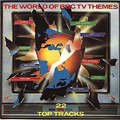
[a] Full-length Version
A full-length version appeared on a BBC Themes LP, cassette and CD in 1989, including versions of the main melody with alternative instruments and different opening and closing ‘starburst’ effects. Unlike earlier extended versions, this does not feature anything dramatically removed from the structure and melodies heard on-screen, but offers a repetative 2 and a half minutes that are very faithful to the theme as heard on TV. A Doctor Who theme single was never released, arguably as a result of the series’ dwindling popularity, and the extended version has yet to be released on a Doctor Who soundtrack release.
| Title | Drn. | Primary Releases | Code |
| Dr Who | 2’37” | The World of BBC TV Themes | BBC ZCF 705 |
[b] Opening Titles
The Doctor Who 25th Anniversary Album featured all the televised arrangements of the Doctor Who theme, including the opening and closing title edits of the new Keff McCulloch theme, minus added effects like the TARDIS and starbursts. The sounds of the TARDIS, asteroids and starbursts flying past the screen were mixed into the titles anew with each episode, with the duration and placement of the effect changing dramatically from week to week. This was standardised for the McCoy DVD releases from The Curse of Fenric onwards, with a new stereo master prepared by Mark Ayres. Shorter edits of the opening and closing titles were created by David Darlington in 2002 and used on Sylvester McCoy’s Big Finish audio stories from Bang-Bang-a-Boom! onwards.
| Title | Drn. | Primary Releases | Code |
| Dr Who (Main Title Theme) | 0’50” | The Doctor Who 25th Anniversary Album | BBC REB 707 |
| Dr Who (Main Title Theme) | 0’50” | The Best of Doctor Who Volume 2 | SSD 1042 |
| Doctor Who | 0’50” | Evolution – The Music from Doctor Who | CDSGP 0320 |
| Doctor Who | 0’50” | Music from Doctor Who | Castle Pulse |
[c] Closing Titles
The commercially released version of the Keff McCulloch closing titles fades out earlier than the televised recording, which was already truncated from the full-length demo. In 2003 the Curse of Fenric DVD included a music-only soundtrack option, which, when accessed, played the theme minus starburst effects for Part Two and the starburst effects minus the theme for Part Three.
| Title | Drn. | Primary Releases | Code |
| Dr Who (Closing Title Theme) | 1’07” | The Doctor Who 25th Anniversary Album | BBC REB 707 |
| Dr Who (Closing Title Theme) | 1’07” | The Best of Doctor Who Volume 2 | SSD 1042 |
| Doctor Who | 1’07” | Evolution – The Music from Doctor Who | CDSGP 0320 |
| Doctor Who | 1’07” | Music from Doctor Who | Castle Pulse |
Dimensions in Time 1 & 2: Adrian Pack & Michael Fillis
Cybertech’s version of the Doctor Who theme was originally arranged in July 1992, and after the Pet Shop Boys and Erasure both declined to record the theme for Children In Need’s Eastenders/Who crossover, JN-T used 20 seconds of the Cybertech mix, as given to him during filming by Michael Fillis (half of Cybertech and a Sea Devil in DiT). The TV version ended with the explosion from the Peter Howell arrangement, and ran over the horiziontally reversed CAL Video graphics, speeded up to match the uptempo theme.
| Title | Drn. | Primary Releases | Code |
| Cybertech – Dumb Mix | 6’13” | Cybertech | CUTUPC D005 |
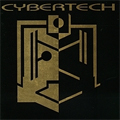
Doctor Who (The Movie): arranged by John Debney & Louis Sponsler
When the programme was revived as an American TV movie in 1996, new producer Philip Segal refused to allow his 1996 Fox Movie to open with anything but the original theme. Played by a 60-piece orchestra, many viewers found the new arrangement comical, but Segal was adamant that, like the Police Box and the sonic screwdriver, it was essential to the success of the film.
The arrangement had been premiered, in a synthesized, ‘demo’ format, at Manopticon 4, a fan convention held in early 1996, where it was said to receive a standing ovation (this version was slightly slower than the final recording, and was also used on early in-house working prints of the film). Heavily reworked but nonetheless instantly recognisable, the arrangement swaps the two sections of the melody around, and imitates the repeat-to-fade section from the 1970s Derbyshire/Hodgson edit.
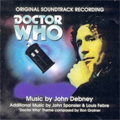
The theme itself begins in the incidental music behind the opening monologue, before building up to a crescendo and a pumping brass beat.
The label for this US-only album carries the message: “For Promotional Use Only. Not Licensed For Public Sale”, and the sleeve contains typographical errors and incomplete information that would not have made it past proof copies. Nevertheless, the soundtrack was widely available in collector’s and specialist shops in both America and the UK, making available the only official orchestral recording of the Doctor Who theme – though not to the length featured in the finished programme (it is only the version used for the closing credits that appears twice on this CD – the first track should have run to over 1’50”). The full opening titles were later included on the isolated soundtrack on the BBC DVD release.
| Title | Drn. | Primary Releases | Code |
| “DOCTOR WHO” Theme | 1’38” | Doctor Who (Promo) | JDCD 005 |
| “DOCTOR WHO” Theme | 0’50” | Doctor Who (Promo) | JDCD 005 |
Storm Warning 1 – [on-going eighth Doctor releases]: Arranged by David Arnold
When Big Finish Productions were granted a license to produce official Doctor Who audio plays, they immediately set about exporing new arrangements of the series’ theme music. Although several versions were recorded, producers Gary Russell and Jason Haigh-Ellery opted instead to use the Delia Derbyshire version more commonly associated with the series. Yet when Paul McGann agreed to return as the Doctor for a special series of plays recorded in May 2000, the company thought it appropriate to finally introduce a new version of the title theme – and asked David Arnold, who had sucessfully updated the theme to Randall and Hopkirk (Deceased) for a new BBC remake and who had recently produced an album of impressively rescored James Bond themes, to interpret the theme anew. The radical new arrangement – intended to be as scary and unpredictable as the original BBC Radiophonic Workshop version – left many listeners bemused, though DWM reviewer Dave Owen felt that “Arnold’s vintage radiophonic sounds suit a transdimensional time machine with a 405-line black and white scanner perfectly” (DWM 302)
Five edits were prepared for use in the audio plays themselves. The first ran to approximately 11 seconds, beginning with the groaning whir and merging into the first notes of the main melody, before cutting to the final repeat-to-fade ‘whoosh’. This acted as an introduction to the teaser sequences for Sword of Orion Part One and Minuet in Hell Part One. The second edit, also approximately 11 seconds in length, began with a scream effect and followed the pattern of the first cut, though with a greater emphasis on the background effects. This acted as the closing title music for Parts One to Three of each story, and also introduced the teasers for Storm Warning Part One and The Stones of Venice Part One. A dramatic 32 second version played as the opening title theme of each episode, with an edit of approximately 45 seconds closing the final episode of most stories. A longer edit of the closing theme – running to some 55 seconds – closed the final episode of The Minuet in Hell.
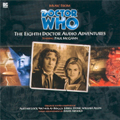
Brand new edits were prepared for the second season of plays, apparently taken from the extended version released on Music from the Eighth Doctor Audio Adventures CDs. Each episode (including Part One, which no longer included pre-titles sequences) opened with a new 34 second edit of the theme, which did not feature the opening whir and which ended on a new repeat-to-fade section that mimicked the 1970s titles. Closing titles on Parts One to Three of each story used a longer edit than before, running between 16 and 22 seconds depending on the length of the fade-out, and Part Four closed with a 58 second edit. Both versions began with a longer and more dramatic ‘scream’ than had previously been heard. These new edits replaced the originals on Storm Warning, Sword of Orion and The Stones of Venice when the episodes were re-edited for broadcast on BBC Radio 7 in 2005, with Nicholas Briggs narrating the story titles and cast credits for the first time.
| Title | Drn. | Primary Releases | Code |
| Theme from Doctor Who | 2’07” | Music from the Eighth Doctor Audio Adventures | BFPCDMUSIC4 |
Rose – [on-going New Series]: Murray Gold
Almost as unexpected as the return of Doctor Who to television was the faithful and exciting new theme arrangement courtesy of Murray Gold, whose semi-orchestral version premiered with episode one, Rose, on 26th March 2005 (although a lot of it had been heard during BBC2’s Doctor Who Night the previous week, and on trailers and interview clips for the new series). His recording actually samples elements of Delia Derbyshire’s original tapes – most notably the main melody line, the closing windbubble and the 1970s sting – but adds an urgent, rhythmic string section and plenty of harmonics. Both the opening and closing titles begin with the glissando, with the closing theme incorporating a semi-instrumental version of the main melody (minus the Derbyshire samples) and some interesting dischords.
For The Christmas Invasion in December 2005, Gold was granted the use of the BBC National Orchestra of Wales to help record his incidental score, and seized the opportunity to have them record his arrangement of the theme. This included the return of the “middle eight” – absent from his original recording of the theme, and much lamented – but when the BBC1 announcer proceeded to talk right over it’s premier airing, BBCi were granted a 30 second clip of the new part for download. The orchestra’s version of the theme was also used on the opening and closing credits of Attack of the Graske, and became the regular closing theme for series two – though the series one version made a surprise appearance at the end of Rise of the Cybermen, cross-fading badly into the orchestra’s middle eight.
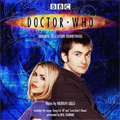
The commerical release of the new theme was surprisingly late – over a year and a half after the return of the series, and long-after both series one and two had finished. A single release on Mute Records was spotted for pre-order on websites such as hmv.co.uk in early 2006; after continual delays this was eventually removed, though rumours flew about the potential first Doctor Who theme single since 1986. In fact, the opening titles theme was included on numerous pieces of merchandise prior to it’s eventual soundtrack release: ‘clean’ versions appeared on the ‘Project: Who?’ documentary CD, the vanilla and boxed set DVD releases, the Tenth Doctor audio books and even on a sound effect-generating pen, but all were edited in some way and some (particularly the DVD versions) were simply taken from the episodes themselves, not a master recording.
| Title | Drn. | Primary Releases | Code |
| Doctor Who – TV Version | 0’43” | Doctor Who – Original Television Soundtrack | FILMCD 1224 |
| Doctor Who – Album Version | 2’36” | Doctor Who – Original Television Soundtrack | FILMCD 1224 |
The album version was created – as the title suggested – specially for the soundtrack CD, using Gold’s Series Two opening titles (which opened the track, and then repeated) and elements from the orchestral recordings, with the middle-eight showcased in a slightly unfinished mix (without Gold’s percussion) and in the Series Two closing-titles style (with a semi-instrumental version of the main melody, the main theme with the Derbyshire samples mixed overtop, and finally the fully-mixed middle-eight). The Derbyshire samples were mixed notably louder than the TV versions, with additional repeats during the bars following the middle-eight, though the sting and final windbubble samples were not used. The final repeat of the main melody featured a sparser version of the orchestra’s parts, a variant that had also been heard during the Children in Need concert version of the theme and rumoured to be incorporated into the televised versions in Series Three.
Unreleased Versions
There have been assorted re-recordings of the theme music used on televised and official spin-off productions of Doctor Who, yet many of them have still to be granted a commerical release. Notable examples from the original and new series include the short opening titles theme from The Ambassadors of Death; the many variations of closing titles from Season 7 (though some were at least preserved on the DVD release of Spearhead from Space); the lower-pitched closing titles from Meglos Part Four (which will most-likely be corrected for DVD by the Restoration Team, since the re-pitching is believed to have been a mistake); the unique closing titles to The Five Doctors (available on DVD, including the isolated soundtrack special feature); and the clean closing titles from the new Series One and Two.
As for the non-televised productions, first up was the traditional mix used on the pilot and concluding web-based episodes of Death Comes to Time in 2001. Sanctioned by BBCi and heard on the television trailers for the story, this version is as official as can be – yet the closest thing to a release of the music was on the remastered versions of the episodes themselves released on CD and mp3 CD-Rom by BBC Audio. Next there was Creation Music’s distinctive dance version, as featured on Scream of the Shalka – the six-part webcast starring Richard E Grant and animated to perfection by Cosgrove Hall. Again, no commercial release, but BBCi offered a download of the full-length titles music (running to just over 1 minute), as well as a selection of the incidental music.
Big Finish have used several new arrangements of the theme on their audio stories: still to be released are the Doctor Who Unbound versions (of which there were two, alternating with each release); Alistair Lock’s version that appeared on Last of the Titans; and Jim Mortimore’s dance remix that graced The Rapture… and of course all of David Darlington’s stereo re-interprettations of the Peter Howell, Dominic Glynn, Keff McCulloch and Delaware opening and closing themes! And although it’s not strictly a title theme, the dance version heard on Doctor Who Confidential is often requested for full-length release by fans…

